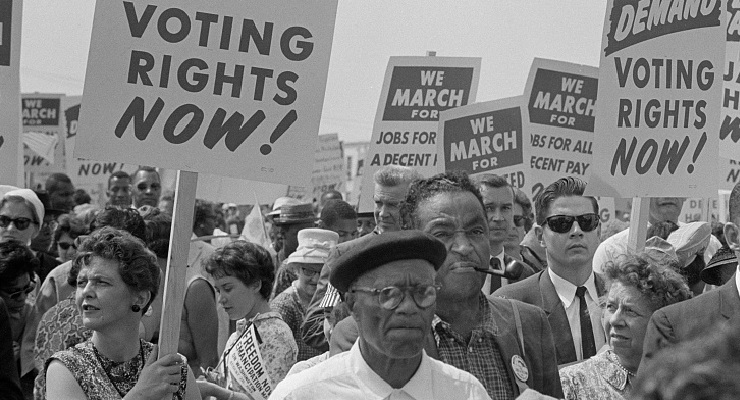The time to reverse the gutting of the Voting Rights Act is now, as problems of voter access remain stubborn. A new article by Vanita Gupta, president and CEO of the Leadership Conference on Civil and Human Rights, in The Root had the story:
Instead of focusing on actual problems, like modern-day voting discrimination, however, the Trump administration is working to further undermine our democracy. One of Jeff Sessions’ first moves as attorney general was to withdraw the Department of Justice’s long-standing position that Texas had engaged in intentional discrimination in enacting its ID law. As the former head of DOJ’s Civil Rights Division, I’m proud of the Justice Department’s work under President Barack Obama to aggressively challenge restrictive voting laws across the country
President Donald Trump’s recently announced election commission, led by Vice President Mike Pence and Kansas Secretary of State Kris Kobach, is key to his administration’s anti-civil-rights mission. The naming of Kobach is deeply troubling—as reporter Ari Berman outlined last week in a must-read New York Times Magazine story (or as The Root did in May).
Needless to say, Kobach is no friend of efforts to expand the franchise. The commission itself is a farce, plain and simple, and focuses on a problem that doesn’t exist. Voter fraud is infinitesimally rare, as has been demonstrated by study after study. Trump’s absurd claim that millions voted illegally during the 2016 election—an election that he won—is both wrong and bizarre.
About the current legal battle over the Voting Rights Act from the ACLU:
Since 1965, the Voting Rights Act (VRA) has protected minority voters at the polls. In June 2013, in a huge blow to democracy, the U.S. Supreme Court struck down the coverage formula used for Section 5 of the VRA, which required jurisdictions with significant histories of voter discrimination to “pre-clear” any new voting practices or procedures, i.e., get federal approval from the Department of Justice, and show that they do not have a discriminatory purpose or effect. Importantly, however, the 5-4 decision did not strike down Section 5 itself, leaving it to Congress to devise a new coverage formula. The ACLU is working with Congress to do just that.
There have been two major amendments to the act including first in 1982, according to information posted on the Justice Department website:
Congress renewed in 1982 the special provisions of the Act, triggered by coverage under Section 4 for twenty-five years. Congress also adopted a new standard, which went into effect in 1985, providing how jurisdictions could terminate (or “bail out” from) coverage under the provisions of Section 4. Furthermore, after extensive hearings, Congress amended Section 2 to provide that a plaintiff could establish a violation of the Section without having to prove discriminatory purpose.
And a summary of the 2006 Amendments:
Congress renewed the special provisions of the Act in 2006 as part of the Fannie Lou Hamer, Rosa Parks, Coretta Scott King, Cesar E. Chavez, Barbara Jordan, William Velazquez and Dr. Hector Garcia Voting Rights Act Reauthorization and Amendments Act. The 2006 legislation eliminated the provision for voting examiners.

Alberta Sabin says
We need fair elections that are not affected by ethnicity. No citizen should have to struggle to cast a ballot.